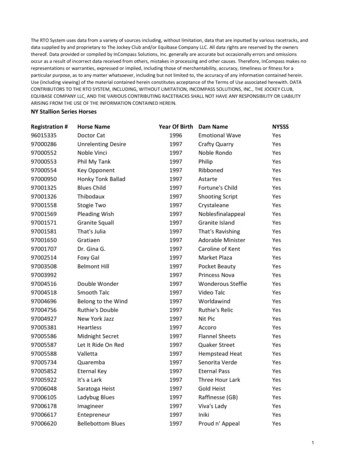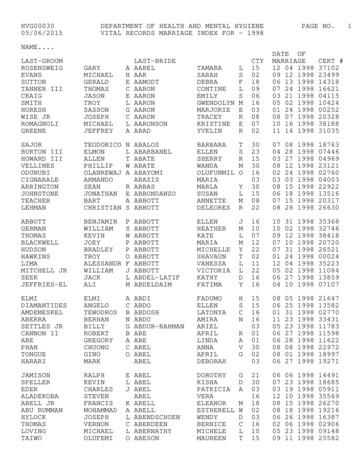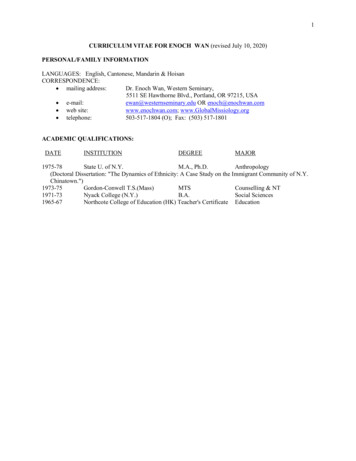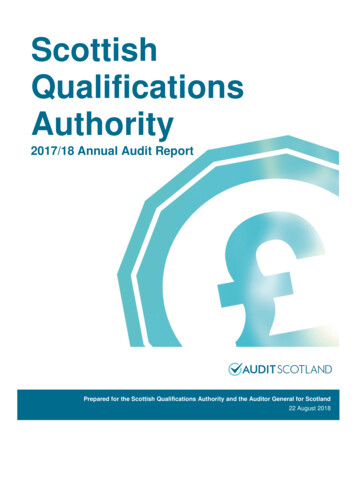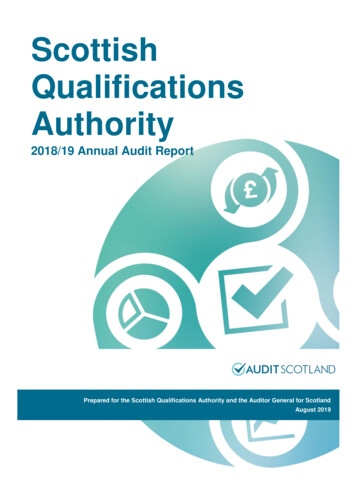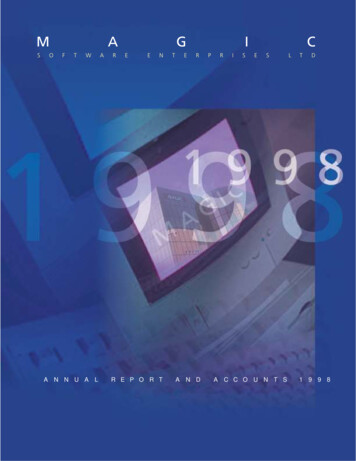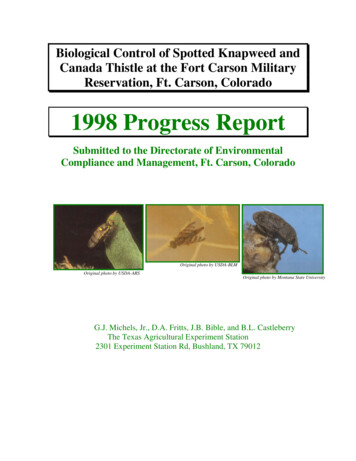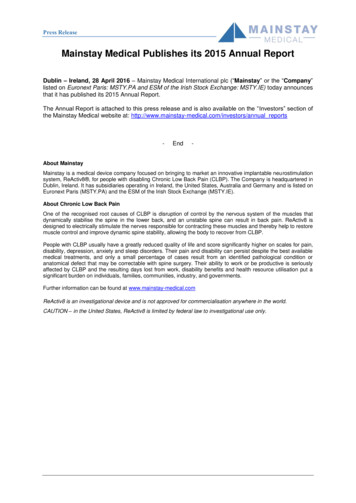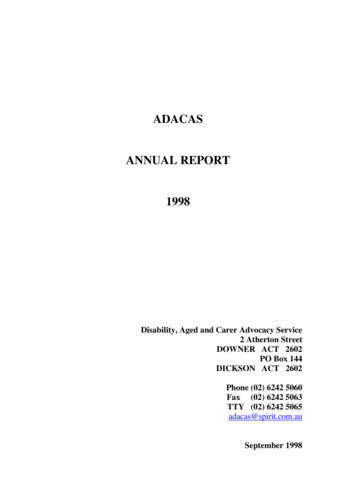
Transcription
ADACASANNUAL REPORT1998Disability, Aged and Carer Advocacy Service2 Atherton StreetDOWNER ACT 2602PO Box 144DICKSON ACT 2602Phone (02) 6242 5060Fax (02) 6242 5063TTY (02) 6242 5065adacas@spirit.com.auSeptember 1998
Table of ContentsADACAS Mission statement . . . . . . . . . . . . . . . . . . . . . . . . . . . . . . . . . . . 3ADACAS Management Committee . . . . . . . . . . . . . . . . . . . . . . . . . . . . . 4ADACAS staff . . . . . . . . . . . . . . . . . . . . . . . . . . . . . . . . . . . . . . . . . . . . . . . 4ADACAS funding . . . . . . . . . . . . . . . . . . . . . . . . . . . . . . . . . . . . . . . . . . . . 5Chairperson’s report . . . . . . . . . . . . . . . . . . . . . . . . . . . . . . . . . . . . . . . . . 6Manager’s Report . . . . . . . . . . . . . . . . . . . . . . . . . . . . . . . . . . . . . . . . . . . . 8Overall results . . . . . . . . . . . . . . . . . . . . . . . . . . . . . 8COOOL . . . . . . . . . . . . . . . . . . . . . . . . . . . . . . . . . . 8Deinstitutionalisation of Hennessy HouseAnd Watson Hostel . . . . . . . . . . . . . . . . . . . . . . . . . 10Funding . . . . . . . . . . . . . . . . . . . . . . . . . . . . . . . . . . 11Evaluation and review . . . . . . . . . . . . . . . . . . . . . . 12Conclusion . . . . . . . . . . . . . . . . . . . . . . . . . . . . . . . . 12Staff reports . . . . . . . . . . . . . . . . . . . . . . . . . . . . . . . . . . . . . . . . . . . . . . . . . 13Advocacy for people who are ageing . . . . . . . . . . . 13Advocacy for people with a disability . . . . . . . . . . 14Work Places Project . . . . . . . . . . . . . . . . . . . . . . . . 16Advocacy ACTion . . . . . . . . . . . . . . . . . . . . . . . . . . . . . . . . . . . . . . . . . . . . 17Appendix A: Data summary . . . . . . . . . . . . . . . . . . . . . . . . . . . . . . . . . . . 19Part I – Advocacy . . . . . . . . . . . . . . . . . . . . . . . . . . 19Advocacy- for people with a disability . . . . . . . . . . . 20- for people who are ageing . . . . . . . . . . . . 21Issues raised . . . . . . . . . . . . . . . . . . . . . . . . 23Results . . . . . . . . . . . . . . . . . . . . . . . . . . . . . 25Part II – Community Education . . . . . . . . . . . . . . 26Part III – Staff Training and Development . . . . . 27Part IV – Networks . . . . . . . . . . . . . . . . . . . . . . . . . 28Index to TablesTable 1:Table 2:Table 3:Table 4:Table 5:Table 6:Table 7:Funding allocation . . . . . . . . . . . . . . . . . . . 51996/7 and 1997/8 Advocacy Issues . . . . . . 191996/7 and 1997/8 Enquiries . . . . . . . . . . . 20ADACAS gender distribution; clients . . . .22ADACAS gender distribution; carers . . . . 22Regional distribution . . . . . . . . . . . . . . . . . 22Age distribution . . . . . . . . . . . . . . . . . . . . . . 232
ADACAS MISSION STATEMENTADACASpromotes and protectsthe rights and responsibilities ofpeople with a disability, people who are ageing, andthose who care for them.3
ADACAS MANAGEMENT COMMITTEECommunity RepresentativesGarry Dellar (Chairperson to May 1998)Helen Watchirs(Chairperson from June 1998)Ann Procter (Treasurer)Gabriel Savas AM (Secretaryand Public Officer)Maree WrightBonnie BrownMaurice SextonJack JonesMichael FowlerKaren ConnaughtonDisability RepresentativesAged RepresentativesCarer RepresentativesADACAS STAFFManagerAdvocate (Aged)Advocate (Aged)Advocate (Disability)Advocate (Psychiatric Disability)Work Places’ Project staffColynne GatesJudy PhillipsJoan Suckling (part-time)Sandra Russet-SilkMichael WoodheadJoanne Milton (Consumer Training andSupport Officer)Ann Macduff (Advocate)Linda Janssen (part-time)Beatrix Bros (part-time)Office Administration4
ADACAS FUNDINGADACAS is funded by two levels of government through three programs:ACT GovernmentHealth and Community Care Program29.65%Commonwealth Government Department of Health and Family ServicesResidential Aged Care Program29.91%Disability Services Program40.44%Table 1Allocation of funds by ProgramADACAS 1997/98 FundingDistributionHACC30%DSP40%RAC30%5
CHAIRPERSON’S REPORTOn behalf of fellow Committee members and staff I would like to thank Garry Dellar,outgoing Chairperson, for his meaningful contribution over the years to ADACAS,particularly during stressful times. We appreciate all his hard work and wish him wellin his future endeavours. Since accepting the position of Chairperson of ADACAS on24 June 1998 I have been most impressed by the professionalism, vision, commitmentand energy of ADACAS staff and management committee members and look forwardto working together in the future to achieve common objectives.In the last year there have been several developments which have impacted onADACAS’ work. One I feel strongly about, given my background as a human rightslawyer, is the reduction in Commonwealth funds to the Human Rights and EqualOpportunity Commission (HREOC). It has been slashed, according to HREOCfigures, by 40% - the Government maintains that this is actually 27% in real terms.Although HREOC’s figures are more substantial, even if one accepts the Governmentfigure, there has been a large downsizing of an essential service to protect the rights ofvulnerable people. This waning commitment is being felt in all States and here in theACT.What is particularly worrying about this trend is that Australia is continuing itsinvolvement in UN and bi-lateral development assistance activities, replicating our“best practice model” in other countries, while HREOC is being white-anted at home.Draft legislation restructuring HREOC which will jeopardise its independence iscurrently being considered by the Senate. If adopted, it will further dilute Australia’simplementation of the 1992 Paris Principles Relating to the Status of National HumanRights Institutions.Another possible target in this winding-back of human rights protection is the reviewof the specialist legal advocacy centres set up under the Disability Discrimination Act1992. In Canberra this service is provided by the Welfare Rights and Legal Centre.A Consultative Committee is to be established with representatives from theAttorney-General’s Department, state managers of Commonwealth Community LegalServices Program (Legal Aid Commissions), the DDA legal services and the NationalAssociation of Community Legal Centres.ADACAS was unsuccessful in seeking to have consumer representation on thisCommittee, despite a partnership approach with real community involvement inreviews being taken in most other fields of government policy, projects and programs.Of further concern was the apparent inability of the Office of Disability, locatedwithin the Department of Health and Family Services, to influence the Legal Aid andFamily Services Division of the Attorney-General’s Department in their decision notto include representatives of people with a disability on the Consultative Committee.The Office of Disability was initially established to report to Government on how itspolicies were affecting the lives of people with a disability, and to maximise theopportunity for their voice to “be heard” by Government.6
It is disheartening to learn that the Office itself is not involved in the review. Neitherdoes it see it as sufficient a priority, given its other responsibilities, to advocate for itsinvolvement.The review is to evaluate the effectiveness and appropriateness of strategies andarrangements employed by the DDA legal services to meet the needs of people withdisabilities (and their associates, such as family and carers) experiencingdiscrimination. A consultancy to conduct the review was advertised on 2 May 1998,but no public decision has yet been given on who is the successful tenderer. Theproject will involve research, client surveys and assessment visits, and consultationswith a wide range of stakeholders, including clients and potential clients, carers,parents and advocates such as ADACAS. It is to be hoped that this review isgenuinely undertaken to improve services for people with a disability, rather thanpossibly being part of a hidden cost-cutting agenda. The results will speak forthemselves in the next year.The Commonwealth Government is undertaking a review, also, of the DisabilityAdvocacy Program. ADACAS receives over 40% of its funding from this program.The Review was initiated in early 1997, and has been conducted in a mostunsatisfactory manner. Advocacy groups were not consulted about the terms ofreference for the review and representatives from groups other than advocacy wereappointed advisors and reference group members.Whilst the report has not been released, informal discussions with Departmentalrepresentatives reveal that submissions from key stakeholders have been passed overin the report. The report’s recommendations are purported to include a reduction inthe numbers of systemic advocacy agencies, and a possible reduction in funding toexisting individual advocacy agencies, in order to fund other agencies in rural andremote regions of Australia.In its submission to the Review, ADACAS pointed out that the total funding providedto advocacy agencies nationally represents the paltry amount of 19 per DisabilitySupport Pensioner per year. It is difficult to see, given this, how Government canjustify cuts to advocacy.Turning now to internal matters, Mr Dellar announced at the last AGM that ADACASwould be reviewing its constitution in 1997-98. I am pleased to announce that thatreview has commenced. The purpose of the review is to evaluate thegovernance/committee structure’s accountability to the needs of the agency’s clientgroup, and to improve opportunities for community support for ADACAS.The outcome of the review should be known before December 1998, andopportunities for community discussion and consideration of the review’s findings,such as meetings with existing consumer groups, will be provided.Helen Watchirs7
MANAGER’S REPORTThis is the eighth annual report of ADACAS, and my second report as Manager. Theformat of the report has changed slightly from previous years. In addition to mycomments, each of the advocacy workers has prepared a short report on the issuesfacing specific client groups. Their reports note significant achievements, andsystemic issues as yet unresolved.In addition, following the decision that ADACAS would auspice Advocacy ACTion,(formerly Parent Advocacy,) there is also a report from their Coordinator, LeeEmerson.Overall resultsWe have again had a very busy year. The statistics reveal that we have increased thenumbers of issues dealt with this year from 514 in 1996-97 to 784 in 1997-98. This isan increase of 52.5% over 1996-97. This has been achieved without an increase inbase funding. ADACAS has provided advocacy support to 370 people during theyear.Of note is the fact that the percentage of successful outcomes achieved has reduced,from 92% in 1996-97 to 89% in 1997-98. It is believed that, in part, this reflects theincreasing complexity of the issues dealt with by ADACAS. However, there may beother reasons, including a decreased flexibility of government and non-governmentagencies in responding to the special circumstances of disadvantaged people whereappropriate responses to their needs fall outside guidelines or usual practice.Client satisfaction rating has increased from 95% in 1996-97 to 96.5% in 1997-98.In addition to direct advocacy support, ADACAS also responded to 589 telephoneenquiries during the year.Full details can be found in the statistical summary, at Appendix A. A note ofcaution should be exercised when reading the statistical results for 1997-98. At thebeginning of this financial year, ADACAS implemented a new data recording system.Whilst definitions of data items recorded were consistent as far as possible with theprevious system, some inconsistencies may have arisen.The agency has been involved with a number of systemic issues, approached from theperspective of groups of clients who have sought our assistance. These includeCanberra’s Own Options of Living, (COOOL), and the de-institutionalisation ofHennessy and Watson Hostels.COOOLADACAS has provided direct advocacy support to 7 of the current COOOLparticipants and indirect support to the members of the Fisher Action Group.8
The issues raised have been largely connected to support and concerns over the roleundertaken by the ACT Government. The systemic issues involve lack of suitableoptions for younger people with high support needs, especially of a medical nature.The COOOL project was initially proposed and developed as such an option.However, the ACT Government has clearly altered its position, and has now indicatedthat people with high medical support needs are best accommodated in nursinghomes. This revised position has left some prospective COOOL residents without acurrent community living option.Aside from a paucity of funds for accommodation support and community living,other systemic issues include the lack of flexible, responsive support options,especially ones which enable people to have maximum control over their supportarrangements.The COOOL project was reviewed earlier this year by Michael Kendrick, aninternationally respected consultant in the Disability field. He was very critical ofADACAS, and the community in general, as well as of the Department of Health andCommunity Care.Mr Kendrick made several recommendations, and the ACT Government undertook toadopt most of them. However, with the passing of time, the only recommendation tobe implemented has been the decision not to renew funding to the independentadvocate for the COOOL participants. The advocate had been working with theCOOOL participants and their families to maximise the degree of independence andcontrol that might be exercised by the residents in respect of their accommodationsupport. This advocacy had been the focus of numerous complaints made by theDepartment, as it had highlighted the inconsistency and other administrativeshortcomings later confirmed by Michael Kendrick in his review.Mr Kendrick also recommended that residents consider other housing options, andthis recommendation was supported by the Government. However, attempts byADACAS to secure guarantees of portability of funding for residents to allow them tomove out of a COOOL house into more normal living arrangements have beenunsuccessful to date.We should not lose sight of the fact that all residents are adamant that their currentarrangements in the COOOL houses are much improved compared to living in anursing home. From our experience to date of negotiations with the Department, itwould seem that moving into the community through a COOOL house, was and stillis the only funded option provided by the ACT Government for younger people with adisability living in aged care facilities.The time spent on COOOL has been significant this year, and it increasedsignificantly after the government discontinued funding to the independent advocate.The data for the individual advocacy issues are included in the general advocacystatistics. However, records indicate an additional 13 meetings held by the ACTDisability Advocacy Network with Ministers and public servants, with COOOLparticipants and with service providers over the six month period to June 1998. Thedata does not record the numbers and duration of telephone calls.9
ADACAS will continue to provide advocacy support to those residents who areseeking alternate living arrangements.Deinstitutionalisation of Hennessy House and Watson HostelThe ACT Department of Health and Community Care, Mental Health Services, hasembarked on a program of reform to Watson Hostel and Hennessy House. ADACASbecame aware of the reforms when we were contacted by staff seeking ourparticipation in residents meetings. From these we became aware of some majorshortcomings with the process of reform. The most critical of these included: no complaints mechanism, or a process of review of decisions;no participation by residents in decisions which profoundly affect their lives;incomplete, changing and conflicting information on the process;lack of recognition of the need for advocacy support for the residents duringthe process.ADACAS wrote initially to the officer in charge of the reforms, seeking additionalfunding to support residents through the change process. When we received no reply,and we became aware of more negative consequences occurring for residents,ADACAS wrote to Mr Richard Clarke, Executive Director Mental Health Services,again without success. ADACAS then lodged a formal complaint with theCommunity Services and Health Complaints Commissioner. After several months,the CS&HCC received a response to our complaint from Mental Health Serviceswhich ADACAS is considering. The complaint is still in progress.In the meantime, stage 2 of the reforms, including the closure of Watson Hostel, isproceeding. Mental Health Services has provided a small amount of additionalresources to ADACAS, which enabled us to contract someone to provide advocacysupport to the residents of Watson Hostel during their community placementinterview. This interview is critical to a successful community placement, as aquestionnaire is completed by the resident which enables them to think about whatsupports they need, where they might like to live, with whom they might live, etc.The additional support provided by ADACAS enabled the residents to be moreinformed about what was happening to them, and to participate more fully in theprocess. Where individual residents had further concerns over the decisions made byMental Health Services, then ADACAS’ regular staff provided advocacy support toenable the resident’s concerns to be heard and appropriately responded to.ADACAS supports the reforms of institutions for people with mental illness,psychiatric, or intellectual disability. ADACAS believes that people should beprovided with the opportunity to live in the community, and that institutions areinappropriate support options for people, whatever their disability, age, or level orkind of support needs.However, it is important that appropriate processes are followed. There have beennumerous examples of deinstitutionalisation projects which have not been successful.Key success factors for authentic change have been proven to be:10
Being clear on the purpose for reform; client best interests or financialimperatives?The articulation of a clear vision;People with the skills to impart that vision to others, to gain their commitmentto it;People with knowledge about change management, and skills to implement it;Involving residents and their families in decisions that affect their lives;Full consultation:- with residents and their families;- with staff;- with the local community.Adequate time for attitudinal change to occur;Resources are available, often for the operation of parallel systems for somesignificant period of time, in order to provide safety-nets for former residents.When, through ADACAS intervention, Mental Health Services were forced to slowthe process down and allow residents time to consider the options, their fullparticipation in their community placement was forthcoming. Until this intervention,residents were resistant and unsure of what would happen to them. This was not anenvironment in which to maximise the chance of successful community placement ofsomeone with a psychiatric disability.This, and other examples, including the time-table for reform, the pressing need toclose Watson Hostel in order to release staff for community support, and the fact thata mere 10 minutes had been allocated by Mental Health Services for each client toundertake their community placement interview, has lead ADACAS to the conclusionthat the motive behind these reforms is more likely to be financial rather than clientbest interests.FundingADACAS is funded by three government programs, and funds were continued,although the Commonwealth Residential Aged Care Program again did not provideindexation funds to meet general increases in costs of service delivery. The net resultof this means that the proportion of ADACAS activity that can be directed towardspeople in nursing homes and hostels has been steadily declining in recent years.The applications for additional funding for people with acquired brain injury, and tosupport clients of Disability Programs through its reforms, as noted in last year’sreport, were all declined as the Government did not see this as a priority. A smallgrant was received from Mental Health Services for institutional reform of WatsonHostel and Hennessy House, as noted above.ADACAS implemented the Social and Community Services Award, (SACS) effectivefrom 16 October 1997. The full impact will not be felt until the 1999-2000 financialyear.ADACAS has sought supplementation from all three funding bodies, with only theACT Government indicating it has funds available. The financial impact of this11
award cannot be met from within ADACAS existing resources. If additional fundingis not provided ADACAS’ operations will be significantly affected from July 1999.Options will be reviewed closer to the time, however it is possible ADACAS will beforced to curtail its operations by 20%, or the equivalent of one day a week.Evaluation and reviewADACAS undertook an audit under the National Disability Services Standards as partof our funding obligations to the Commonwealth Disability Services Program. Therewas one change required under administrative procedures, which has now beenattended to.As part of the audit an independent survey was undertaken of clients with a disability.Fifty-five questionnaires were mailed to previous and current clients, with 18responses being received by the consultant. The comments were, overall, veryfavourable.There were, however, some negative ones which were in relation to not contactingpeople promptly or not keeping people as well informed as we used to. Both of thesefactors are likely to be related to increasing workload, and will be monitored over thecoming year.The consultant, who is engaged by the Commonwealth’s Disability Services Programto provide consumer support for standards monitoring to services in the ACT andNSW, noted:“ In conclusion, the positive responses to this questionnaire indicate to methat ADACAS provides a vital service to its clients. No other client group,through responses to a questionnaire has presented such a strong case infavour of the service they receive.”ConclusionThe provision of advocacy to some of the most vulnerable people in our society isvital. It needs to be recognised and understood, and appropriately resourced by thecommunity. There are numerous indicators which show that this is not happening.The COOOL project and the reforms at Watson Hostel and Hennessy House are buttwo examples which indicate that advocacy, and its role in the lives of vulnerablepeople, is little understood by many in positions of influence over advocacy and/or thelives of such people.For its part, ADACAS will continue to advocate for the rights of people with adisability and those people who are ageing, to the best of its ability and to themaximum of its resources. Through this activity, ADACAS seeks to inform andeducate others on the importance of advocacy, and to foster inclusive communitieswhich are responsive to the needs of all people.12
STAFF REPORTSAdvocacy for people who are ageingADACAS employs two staff in this section, both of them working with older peoplein nursing homes and hostels or in the community.Judy Phillips has been at ADACAS for over five years. Her background is inpsychology and graduate studies in special education. Originally, Judy worked in thedisability area for three years and then moved across to the aged area when the jobbecame available. She tells us that she wanted a fresh challenge; and she certainly hasbeen presented with that!Judy has the responsibility of coordinating ADACAS’ work with older people innursing homes and hostels, and provides the following comments in that context.“This year has been very busy in the aged area. I have had to close my books on threeoccasions and go on priority of access, which meant that I was only able to take onurgent issues.There was a flurry of activity during the period just prior to the introduction of theAge Care Act last year with potential residents and their families being veryconcerned about the proposed accommodation bond for nursing homes. With theamended outcome of an accommodation charge, distress levels seemed to diminish.ADACAS had input into the Senate Standing Committee about the issues which hadbeen raised with us in respect of the reforms.We continue to be concerned about the fear of retribution expressed by residents insome facilities in respect to making complaints. We are aware from discussions withour counterparts in other states that this is a national concern. We are hoping that theaccreditation process will effect a change in culture and residents will be encouragedto voice their opinions as part of the facility getting meaningful feedback.We have been involved in a number of abuse cases: physical abuse, (eg on an elderly parent by their family) domestic violence (yes it still happens to elderly people!) financial abuse (eg abusing Power of Attorney and emptying a bank account] neglect (eg an elderly person not receiving enough or the correct food) harassment of elderly people by staffElder abuse and neglect is a concern that I share with other professionals. ADACASis hoping to hold an event later this year that will raise awareness of this issue afresh.Also I am on a steering committee organised by Council on the Ageing which islooking at this issue.”Joan Suckling has worked for ADACAS for over two years. Joan was initiallyemployed to undertake a project researching and promoting the need for advocacy forpeople with acquired brain injury.13
Joan now works part-time as advocate for older people, and coordinates the agency’swork in respect of older people living in the community. She has provided thefollowing comments.“This has been a hectic year during which issues relating to equipment, health,finances and accommodation have arisen on a regular basis. However, during thistime we have also seen a rise in the number of cases involving abuse and the need forsupport to go through the legal system.While most issues have been resolved satisfactorily, one in particular stands out asrequiring further attention. This was the case of a woman who had moved into anAged Persons unit owned by the ACT Housing Trust. Her unit was a mid-terraceunit, with a backyard. After moving in, she found that she did not have an automaticright of access from her backyard, as there was no gate in the fence, and that thiscould only happen through the generosity of her neighbours.Unfortunately this was not forthcoming, and this not only raised both safety andsecurity issues for her, but also meant that any maintenance or gardening workrequired in the backyard could only occur via access through her home, for example,transporting soil, fertilisers, grass and tree clippings, and equipment through thelounge room.After much negotiation with the Housing Trust and the Minister for Urban Services,this client was eventually relocated to a more suitable property. However, the issue ofpoor design of some properties owned by the Trust continues to be unresolved.”Advocacy for people with a disabilityADACAS employs two full-time staff to provide advocacy for people with adisability.Michael Woodhead has held the position of Advocacy Worker for People with aPsychiatric Disability with ADACAS for three and a half years. He has a backgroundin education, community development and social justice. Michael has provided thefollowing report.“In 1997-98 I have supported 94 clients, 84 with a psychiatric disability, 3 who arecarers for a person with a psychiatric disability and 7 with an intellectual or physicaldisability or with an acquired brain injury. A number of clients had a dual diagnosis.The clients have had a total of 260 issues, including 13 for clients who are residents ofWatson or Hennessy Hostels. Issues were largely in the following areas; Health (48issues), Legal (40 issues – not including Restraining or Domestic Violence Orders),Accommodation (39 issues), Abuse/Violence (34 issues – including Restraining andDomestic Violence Orders), Rights/Standards/Discrimination (22 issues), Access toServices/Eligibility – 17 issues, Financial (14 issues) and Community Options (12issues).14
Major systemic issues include: the lack of full participation of residents and advocates in the process ofdeinstitutionalisation of Watson Hostel; lack of credibility given to people with a disability when requesting policeassistance; lack of appropriate public housing for people with a psychiatric disability;increased obstacles faced by people with a psychiatric disability whenapplying for priority transfers in public housing; delays and obstructions in the processing of workers compensation claimswhich, in turn, leads to stress-related illnesses; increased bullying and harassment of workers by managers and fellowworkers which, in turn, also leads to stress-related illnesses; clients of Mental Health Services, who have previously been victims of sexualabuse, are unable to receive appropriate counselling and support in respect oftheir assault through MHS, which may be a significant factor in their state ofmental health.Unfortunately, many of these issues were identified by ADACAS in previous yearsand referred to appropriate authorities for action. It is not a satisfactory situation thatso many of our generic agencies are ignorant of, and in some cases, blatantly abusiveof, people’s human rights. ADACAS will be considering more effective strategies forresolving these systemic issues.”Sandra Russet-Silk has worked as the Disability Advocate at ADACAS for the past2 years. From 1987 Sandra worked in a voluntary capacity with people who havebeen
ADACAS ANNUAL REPORT 1998 ADACAS ANNUAL REPORT 1998 Disability, Aged and Carer Advocacy Service 2 Atherton Street DOWNER ACT 2602 PO Box 144 DICKSON ACT 2602 Phone (02) 6242 5060 Fax (02) 6242 5063 TTY (02) 6242 5065 adacas@spirit.com.au September 1998 2 Table of Contents
